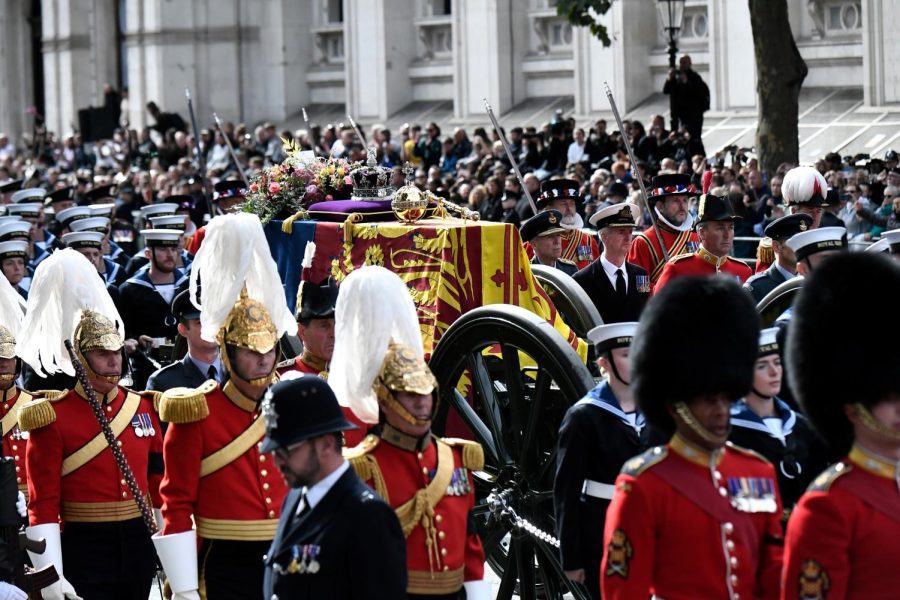Opinion | Don’t expect change in Britain
Photo courtesy of Stephane de Sakutin/WPA Pool/Getty Images/TNS
The coffin of Queen Elizabeth II, draped in the Royal Standard, rests on the State Gun Carriage as the funeral procession proceeds from Westminster Abbey to Wellington Arch on Sept. 19.
Sep 26, 2022
The political landscape of the United Kingdom has undergone major superficial — but hardly substantive — change since this summer. The state has paradoxically undergone one of the most talked-about leadership changes in recent memory without any significant deviation from the status quo on the horizon.
The first phase of Britain’s makeover came with the resignation of Boris Johnson in July. Boris bowed out due to pressure from his party, even after surviving a no-confidence vote called in response to a batch of scandals involving his administration and coronavirus lockdown parties, among other things.
Then, of course, came the death of Queen Elizabeth II on Sept. 8. The end of her 70-year reign, one of the longest of any sovereign in history, brought Britain to a halt with a series of mourning rituals most of the public had never witnessed before.
Gone is the age of Elizabeth II, and of the awkward pair of Elizabeth and Boris; history now casts a desultory glance toward Charles and Liz. That is, King Charles III, Britain’s new monarch, and Liz Truss, its new prime minister. It’s worth considering what these changes might mean, and what all the attention is worth.
It’s hard to ignore the diversity of opinion and sentiment surrounding the queen’s death. There has, of course, been an outpouring of praise and homage in Elizabeth’s honor on both sides of the Atlantic. Many people, among them many Americans, seem to have revered the queen so fervently that her death elicits real grief.
Get The Daily Illini in your inbox!
Scores of others seem not to care at all — a generational divide may be at play here — and these people have reveled rather diligently in their apathy via internet humor. Each reaction offers political and cultural insights.
Why does the monarchy still matter to people, especially Americans? It stands at once as a symbol of eroded empire, one which oppressed large swaths of the world, and as a vapid house of scandal. Likeability of its figureheads aside, it’s hard to understand why an institution proclaiming divine authority at the expense of republican self-government is appealing to anyone — though it still manages to charm many, like religion itself.
Vicarious pleasure might explain some of the royal fascinations. The comings and goings of this or that member of the royal family amount to another wing of celebrity culture, and this attracts public interest.
Conversely, those that disavow the queen and her family with too much vitriol come off a bit boring in my view. The British empire deserves the hate it receives, to be sure; throw a dart anywhere on a map of the world and you’ll likely find a victimized country willing to testify to that.
Still, the royals are an easy target, which lands them their fair share of lazy criticism. Queen Elizabeth inherited the British legacy at a young age without much choice and was by most accounts a benevolent woman, after all. These factors deserve some consideration in assessments of her reign.
In any case, if scandal is the norm for the monarchy, don’t expect Charles to break the mold. His accession to the throne was fittingly preempted with controversy this past July when his amusingly stupid decision to take money from the bin Laden family in 2013 went public.
The transaction, or rather donation, itself wasn’t as bad as it sounds. The bin Laden family disowned Osama long ago — they offered a 1 million pound donation to Charles’ charity and its board of trustees approved it. The issue is what this reveals about Charles’ judgment. All his advisers told him the decision would go public and look horrible. His Majesty was not swayed.
Ironically, Prime Minister Truss had her finger on the solution to the whole business all along. As a 19-year-old Oxford student, Truss advocated for the abolition of the monarchy. Alas, her destiny as Britain’s next great tax-cutting Tory leader demanded she spend her career walking that particular take back.
Anyway, since sentimentality for leaders gone by seems to be fashionable right now, I’ll admit that I will miss the antics of Boris Johnson. If Britain has to have a leader with terrible policies, at least let him have the hair of a macaroni penguin and the raw spirit needed to barrel over a young child in a casual game of rugby.
Of course, even his humorous highlight reel can’t compensate for the damage he did to Britain and Europe, especially through Brexit. And Truss is intent on deepening that damage. Her agenda features lower taxes for the wealthy and fewer limits on banking bonuses, policies she doesn’t even pretend to believe will lessen income inequality or aid struggling workers.
Britain thus seems to be headed for more of the same. True, things may feel different to its citizens with the queen gone. But for all intents and purposes, the world can settle in for more royal drama and unforgiving conservative economic policy.
Eddie is a senior in LAS.






